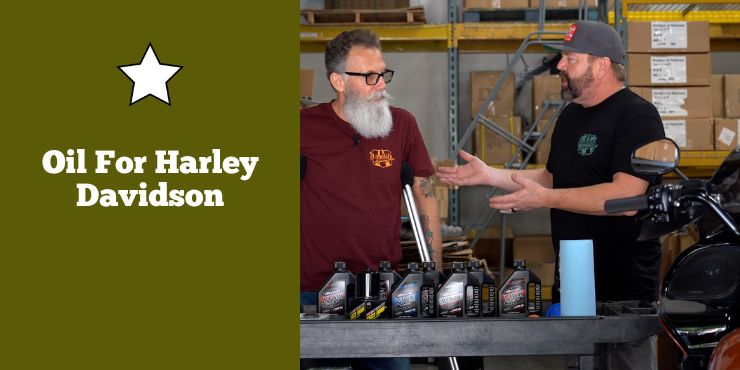The importance of oil for Harley-Davidson bikes cannot be overstated. Oil serves as the lifeblood of the bike’s engine, playing a key role in maintaining its performance, reliability, and longevity. Proper lubrication offered by the right type of oil will reduce friction between moving parts, prevents wear and tear, and dissipate heat effectively. Harley-Davidson engines operate at high temperatures and stresses, making the choice of oil important for ensuring optimal performance and protection against potential damage. Following the manufacturer’s recommendations on oil type and viscosity and adhering to regular oil change intervals will help keep your Harley-Davidson bike running smoothly and roaring on the open road for years to come.
Harley-Davidson motorcycles typically use specific synthetic oils that meet Harley’s standards, such as SAE 20W-50 or Harley-Davidson’s Syn3 for all three compartments.
What type of oil should I use in my Harley-Davidson engine?
Harley-Davidson bikes are renowned for their iconic style, powerful engines, and the freedom of the open road they represent. As a Harley-Davidson rider, one of the most important maintenance tasks you must perform is selecting the right oil for your engine. The motorcycle oil plays a key role in keeping the engine running smoothly and efficiently, ensuring a long-lasting and enjoyable riding experience.
>>> Click here to read our review of the Best Oil For Harley-Davidson <<<
As you cannot do without your favorite snacks and drinks, your Harley-Davidson motorcycle cannot do without engine oil. However, selecting the right type of oil might be tricky because of the different engine specs. Now, you might wonder what type of oil should I use in my Harley-Davidson engine.
There are different types of oil options available for Harley-Davidson bikes. The type of oil that is recommended for Harley-Davidson motorcycles is the AMSOIL Full Synthetic 20W-50 oil. Harley-Davidson recommends that riders should use SAE 20W-50 or the Mobil 1 20W-50 V-Twin Synthetic Motorcycle Motor Oil. These options are ideal as they are full synthetic oil options that lubricate the engine properly. However, this does not necessarily mean that there aren’t other types of oil that you can use for your bike. However, to do that, you will still need to consider factors like viscosity, API and JASO ratings, and more.
Harley-Davidson bike engines can benefit from using either synthetic or conventional oils, depending on your preferences and riding habits. Synthetic oils offer superior performance and protection, especially during high temperatures and heavy loads. They have better resistance to breakdown, which leads to longer oil life and reduced engine wear. If you frequently ride in extreme conditions or engage in high-performance riding, synthetic oil might be the preferred choice. Conventional oils are more budget-friendly and they can provide adequate protection for general riding conditions. They are ideal for riders who follow regular maintenance schedules and don’t subject their engines to extreme operating conditions.
Viscosity refers to the oil’s resistance to flow at different temperatures. Harley-Davidson engines typically operate at higher temperatures than regular car engines, so it’ll be important to choose the oil with the correct viscosity. Look for oil that is rated for high temperatures and offers proper lubrication during both cold starts and hot running conditions.
When selecting oil for your Harley-Davidson engine, make sure that it meets the American Petroleum Institute (API) and Japanese Automotive Standard Organizations (JASO) specifications. You should look for oils that have an API rating of SG, SH, SJ, SL, SM, or SN, as they’re ideal for use in gasoline engines. You should check for JASO ratings, which indicate that the oil is suited for use with wet-clutch systems. For Harley-Davidson bikes equipped with wet clutches, you should look for oils with JASO MA or MA2 ratings to prevent clutch slippage and ensure proper clutch engagement.
The most important factor in selecting the right oil for the Harley-Davidson engine will be to follow the manufacturer’s recommendations. Refer to your bike’s owner’s manual or contact your Harley-Davidson dealership for specific oil recommendations for your model and year. The company tests different types of oils to ensure they meet the engine’s requirements and using the recommended oil will help maintain the manufacturer’s warranty and optimal performance.
>>> READ MORE – What type of oil should I use in my Harley-Davidson engine?
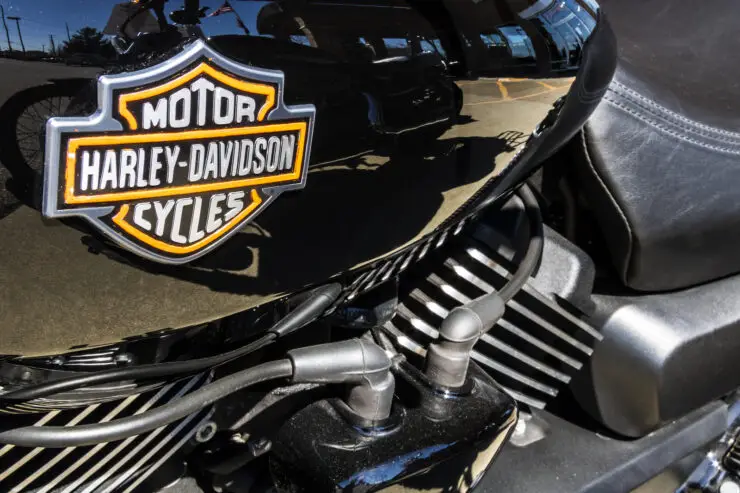
What is the recommended oil change interval for a Harley-Davidson?
To make sure that your Harley-Davidson motorcycle continues to deliver its legendary performance and reliability, proper maintenance will be important. Among the crucial maintenance tasks will be changing the engine oil at regular intervals. This is why you might want to know what is the recommended oil change interval for a Harley-Davidson bike.
If you have a Harley-Davidson motorcycle, it is recommended that you should change the oil in your bike once every 2,500 to 5,000 miles after the initial inspection of 1,000 miles. However, you can change semi-synthetic oils between 5,000 and 6,000 miles, sometimes even stretching it to 8,000 miles. Full synthetic oils can go as much as 7,000 to 10,000 miles before requiring an oil change. You should expect to change the oil once every 3-4 months to get the best results, especially if you go on rough terrains and work the motorcycle’s engine to the maximum.
Harley-Davidson, like any reputable motorcycle manufacturer, offers specific guidelines regarding oil change intervals for its bikes. The exact oil change interval could vary depending on the model, year, and engine type of the bike. However, it is important to refer to your bike’s owner’s manual for the manufacturer’s official recommendations.
While following the manufacturer’s guidelines is important, certain riding conditions might warrant more frequent oil changes. If you frequently ride in extreme weather conditions, such as hot summers or cold winters, or engage in high-performance riding, your engine might experience more stress, leading to faster oil degradation.
Moreover, if you ride in dusty or off-road environments, your motorcycle might be exposed to more contaminants that can affect the oil’s performance. In such cases, it might be beneficial to change the oil more frequently to maintain the engine’s health.
Regularly inspecting the oil will give you valuable insights into its condition and help you determine if an early oil change is necessary. Check the oil level and color and pay close attention to any signs of contamination or unusual odors. If you notice that the oil appears dark, has a burnt smell, or contains particles, it’ll be an indication that the oil might have reached the end of its service life and should be changed.
Regular and timely oil changes are important for maintaining the health and longevity of your Harley-Davidson bike’s engine. Fresh oil will provide optimal lubrication, reducing friction and wear on engine components. It’ll also help to dissipate heat effectively, preventing the engine from overheating.
Neglecting timely oil changes could lead to oil breakdown, sludge formation, and decreased lubrication efficiency, resulting in premature engine wear and potential damage. Investing in regular oil changes will be a small price to pay for the long-term reliability and performance of your beloved Harley-Davidson motorcycle.
>>> READ MORE – What is the recommended oil change interval for a Harley-Davidson?
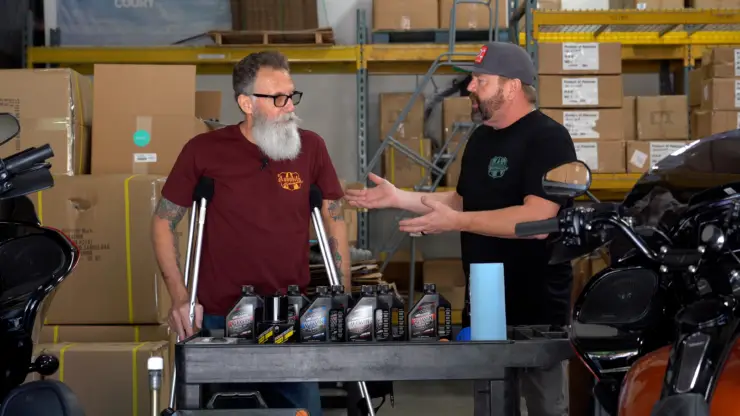
How often should I check the oil level on my Harley-Davidson?
For a Harley-Davidson rider, their bike is more than just a bike. It represents a lifestyle and a sense of freedom that comes along with it. To ensure your Harley continues to deliver its legendary performance and reliability, proper maintenance will be important. One of the ways to ensure that is by regularly checking the oil level and making sure it is in optimal condition or if it needs changing.
Typically, it is recommended that you should check the oil level before every ride. However, sometimes that isn’t enough. There are some other situations where you need to check the oil level such as after long rides, after washing your bike, after storage, and more.
The first step to determine how often to check the oil level will be to refer to your bike’s owner’s manual. Harley-Davidson offers specific guidelines regarding maintenance and inspection intervals, including how frequently you should check the oil level. Usually, it is recommended that you should inspect the oil level on your Harley-Davidson bike before each ride. This pre-ride check will ensure that you’re starting the journey with the proper amount of oil in the right condition, maximizing lubrication, and protecting vital engine components.
After long rides, especially on hot days or when you’re riding through challenging terrains, it is advised that you should check the oil level in your bike. Prolonged riding can result in increased engine heat and excess oil consumption. By verifying the oil level after extended rides, you will be able to make sure that the engine hasn’t experienced any excess oil loss.
Washing your motorcycle is another part of its maintenance routine. However, the process of washing can inadvertently displace or exposed seals, resulting in oil leaks. After you have washed your bike, you should take a moment and re-check the oil level. While oil leaks are relatively rare on properly maintained bikes, it is another opportunity to check the oil levels and ensure that everything is in order after cleaning.
If you have stored your bike for an extended period of time, checking the oil level will be important before you fire up the engine for the first time. During extended storage, the oil ends up settling or experiences slight evaporation, potentially affecting the oil level. Before firing up the bike, you must perform a thorough pre-ride inspection, including checking the oil level. If the oil level is lower than normal, you must top it up to the appropriate level with the recommended oil type before you embark on your first ride after storage.
>>> READ MORE – How often should I check the oil level on my Harley-Davidson?
How often should I change the oil on my Harley-Davidson?
To keep your Harley-Davidson motorcycle running at its best and ensure smooth rides on the open road, proper maintenance will be important. One of the most important maintenance tasks will be changing the oil from time to time.
Aside from regularly checking the oil level, it is important to adhere to the recommended oil change intervals and know how often to change the oil on your bike. To be on the safer side, Harley-Davidson motorcycles require an oil change once every 2,500 to 5,000 miles depending on the specific Harley-Davidson model and type of oil used. Regular oil changes will help in maintaining the engine’s health as fresh oil will offer optimal lubrication and help remove contaminants.
Once you or a professional mechanic have performed an oil change, it’ll be essential to double-check the oil level and ensure that it was correctly refilled and that it reaches the appropriate level on the dipstick. Harley-Davidson recommends that every rider should preferably use SAE 20W-50 or the Mobil 1 20W-50 V-twin synthetic motorcycle motor oil.
For more precise guidance on how often should I check the oil level on my Harley-Davidson motorcycle, you should refer to the owner’s manual. Harley-Davidson motorcycles come with detailed recommendations and guidelines tailored to each specific model. Following the manufacturer’s advice will help you make sure that you’re maintaining your bike in accordance with the expert recommendations, giving you assurance and peace of mind.
While following the manufacturer’s recommendations is important, certain riding conditions might warrant more frequent oil changes. If you frequently ride in extreme weather conditions, such as hot summers or cold winters, or engage in high-performance riding, your engine might experience more stress, leading to faster oil degradation.
Moreover, if you often ride in dusty or off-road environments, your motorcycle may be exposed to more contaminants that can affect the oil’s performance. In such cases, more frequent oil changes will help maintain the engine’s health and extend its lifespan.
While following a specific mileage interval is important, regularly inspecting the oil will provide valuable insights into its condition. Check the oil level and color and pay close attention to any signs of contamination or unusual odors. If you notice that the oil appears dark, has a burnt smell, or contains particles, it is an indication that the oil might have reached the end of its service life and should be changed.
Regular and timely oil changes are important for maintaining the health and longevity of your Harley-Davidson bike’s engine. Fresh oil will provide optimal lubrication, reducing friction and wear on engine components. It’ll also help dissipate heat effectively, preventing the engine from overheating.
Neglecting timely oil changes could result in oil breakdown and decreased lubrication efficiency. This can result in premature engine wear and potential damage. Investing your time, effort, and money in regular oil changes will be a small price to pay for the long-term reliability and performance of your Harley-Davidson motorcycle.
>>> READ MORE – How often should I change the oil on my Harley-Davidson?
What is the recommended viscosity of oil for a Harley-Davidson?
Harley-Davidson bikes are quite powerful and the iconic V-Twin engine is the heart of these riding experiences. To keep your motorcycle running smoothly and to protect its engine, choosing the right oil with the recommended viscosity will be crucial.
Viscosity is a measure of oil’s resistance to flow and it plays a key role in determining how well the oil lubricates and protects the engine. The Society of Automotive Engineers (SAE) has developed a numerical scale to classify oil viscosity grades with lower numbers representing thinner oils and higher numbers denoting thicker oils.
For a Harley-Davidson motorcycle, the ideal oil viscosity will depend on the specific engine type and model year. However, it is recommended that for most Harley-Davidson bikes, the 20W-50 oil should be used. The viscosity grade provides the perfect balance between cold-start protection and high-temperature performance.
The first number in the viscosity grade will refer to the oil’s cold temperature performance (at 0 degrees Fahrenheit) whereas the second number indicates its performance at high temperatures (212 degrees Fahrenheit). For instance, a 20W-50 oil features a lower viscosity when cold (20) and a higher viscosity when hot (50).
The 20W-50 oil will be ideal for most Harley-Davidson engines, including the popular Twin Cam and Milwaukee-Eight engines. This oil option offers adequate flow at low temperatures, ensuring smooth startups and quick oil circulation during cold weather. Moreover, it maintains its stability and protective properties even when the engine heats up during long rides or high-performance conditions.
Older Harley-Davidson motorcycles with Evolution engines may have a lower recommended viscosity, such as 10W-40. However, you must refer to your bike’s owner’s manual or consult the Harley-Davidson dealership for the exact viscosity recommended specific to your bike’s model and year.
>>> READ MORE – What is the recommended viscosity of oil for a Harley-Davidson?
What is the best oil for Harley-Davidson?
To keep your Harley-Davidson bike running smoothly and performing at its peak, choosing the best oil for Harley-Davidson engine will be important. With a wide range of oil options available, finding the right one can be overwhelming. Synthetic oils are the best oil option for Harley-Davidson motorcycles. These oils provide superior performance and engine protection, making them a great choice among motorcycle enthusiasts.
There are different types of oil ideal for a Harley-Davidson bike but arguably the best oil option is the AMSOIL Full Synthetic Motorcycle Oil 20W-50. A much more affordable oil option will be the Castrol 06116 Power 1 V-Twin 4T 20W-50. If these options aren’t available, you can go for the next best option, the Mobil 1 96936 20W-50 Twin Synthetic Motorcycle Oil.
Here is some more info on some of the best oil options for a Harley-Davidson motorcycle –
#1. AMSOIL V-Twin Synthetic Motorcycle Oil
AMSOIL is renowned for producing high-quality synthetic oils and their V-Twin Synthetic Motorcycle Oil is designed to deliver maximum performance in Harley-Davidson bikes. This oil boasts a high film strength, providing excellent protection to the engine’s moving parts under extreme pressure.
AMSOIL V-Twin Synthetic Motorcycle Oil has been engineered to withstand high temperatures and resist oxidation, making sure that the engine remains protected and lubricated during hot summer rides and long-distance tours. Its formulation will also help minimize engine noise and provides a smooth and responsive throttle feel.
#2. Castrol Power 1 V-Twin Synthetic Engine Oil
Castrol’s Power 1 V-Twin Synthetic Engine Oil is another impressive option for Harley-Davidson motorcycles. This fully synthetic oil is designed for delivering superior acceleration and power, making it perfect for riders who crave performance. It provides exceptional protection against engine wear and deposit formation, helping to keep your engine clean and running optimally.
This engine oil also helps in reducing engine noise and delivers consistent performance throughout the oil change interval. It is available in different viscosities, allowing you to choose the one that suits your Harley-Davidson model and riding style.
#3. Mobil 1 V-Twin Synthetic Motorcycle Oil
Mobil 1 is a well-respected name in the world of synthetic oils and their V-Twin Synthetic Motorcycle Oil is no exception. Formulated specifically for high-performance V-Twin engines, the oil will offer exceptional protection against engine wear, corrosion, and thermal breakdown.
Mobil 1 V-Twin Synthetic Motorcycle Oil is available in various viscosities that cater to different Harley-Davidson bikes and riding conditions. Whether you have a Twin Cam, Milwaukee-Eight or Evolution engine, Mobil 1 V-Twin Synthetic Motorcycle Oil is a top-notch option to keep the bike running smoothly and performing at its best.
#4. Red Line V-Twin Synthetic Motorcycle Oil
Red Line V-Twin Synthetic Motorcycle Oil is a premium offering that offers excellent protection for your Harley-Davidson engine. This fully synthetic oil is formulated specifically to reduce wear and tear on critical engine components, ensuring a longer engine life.
The Red Line V-Twin Synthetic Motorcycle Oil suffers superior thermal stability and resists oxidation, preventing the formulation of harmful deposits and sludge in the engine. Its robust formulation will also help in improving clutch performance, preventing clutch slippage, and ensuring smooth gear shifting.
>>> READ MORE – What is the best oil for Harley-Davidson?
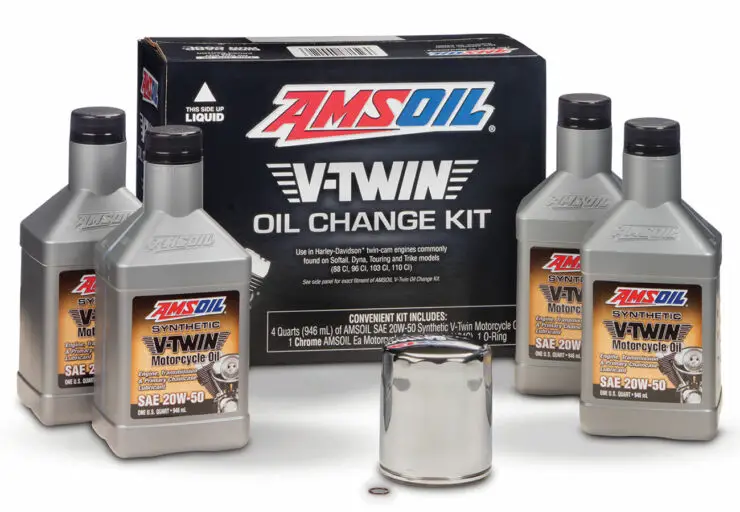
What type of oil should I use in my Harley-Davidson transmission?
If you own a Harley-Davidson motorcycle, you’ll need to understand the importance of proper maintenance to keep your motorcycle running at its best. One of the maintenance tasks that you should consider will be choosing the right oil for your Harley-Davidson transmission. The transmission is the heart of smooth gear shifting and overall performance, making the choice of oil important for ensuring optimal operation and longevity. This is why it’ll be important to select the best oil for your Harley-Davidson bike’s transmission, ensuring that you keep your ride shifting gears smoothly.
Harley-Davidson recommends that you should use a specific type of transmission lubricant for its motorcycle. You must adhere to the manufacturer’s recommendations to maintain your motorcycle’s warranty and ensure the best possible performance.
Harley-Davidson motorcycles, especially those with Big Twin transmissions, require transmission lubricants that meet specific requirements. You must look for lubricants that are specifically formulated and labeled as “Transmission Lubricant” or “Transmission Fluid” for use in Harley-Davidson motorcycles.
Harley-Davidson offers its own line of transmission lubricants, specifically formulated for its bikes. Using the recommended Harley-Davidson Transmission Lubricant will ensure that you are using a product designed to meet the manufacturer’s strict standards and provide optimal performance for your bike’s transmission. Harley-Davidson Transmission Lubricants are engineered to offer excellent lubrication and protection, reducing friction and heat buildup in the transmission. They’re available in various viscosities to match different Harley-Davidson models, ensuring a perfect fit for your bike’s transmission needs.
While transmission fluids from Harley-Davidson offer impressive performance, there are also transmission fluid options by the likes of Red Line, Mobil, Spectro Oil, Valvoline, etc. offer added benefits. Synthetic fluids are engineered to withstand higher temperatures and provide better resistance to breakdown, oxidation, and sludge formation. They also offer better lubrication and reduced friction, which can contribute to smoother gear changes.
If you ride in extreme conditions, like hot summers or in heavy traffic, or if you engage in high-performance riding, synthetic transmission fluid will be a great choice to enhance your transmission’s performance and longevity.
>>> READ MORE – What type of oil should I use in my Harley-Davidson transmission?
What oil filter should I use on my Harley-Davidson?
The oil filter plays a pivotal role in keeping your Harley-Davidson bike’s engine clean by removing contaminants and debris from the oil. With various oil filter options available, selecting the best one can be quite overwhelming. It is normal to wonder what oil filter should I use on my Harley-Davidson bike.
When it comes to choosing an oil filter for your Harley-Davidson motorcycle, using a genuine Harley-Davidson oil filter is usually recommended. Genuine filters are specifically designed and tested for meeting the high-quality standards set by Harley-Davidson. They are engineered to fit your bike’s engine perfectly, ensuring proper filtration and protection.
Using a genuine Harley-Davidson oil filter will help maintain your motorcycle’s warranty and ensures that you are using a filter that is compatible with your bike’s specific model and year. These filters undergo extensive testing to provide optimal performance and filtration efficiency.
If you are looking for alternatives to genuine Harley-Davidson oil filters, there are reputable aftermarket options available. There are many well-known brands like K&N, HiFlo Filtro, and more that produce high-quality oil filters designed to meet OEM specifications. When choosing an aftermarket filter, you should consider factors like filtration efficiency, bypass valve, anti-drain back valve, and more.
Look for oil filters that have high filtration efficiency, capable of capturing small particles to prevent engine damage. An anti-drain back valve prevents oil from draining back into the oil pan when the engine is off, making sure of immediate oil flow on startup. A bypass valve will allow the oil to flow directly to the engine in case the filter becomes clogged, preventing engine damage during extreme conditions.
Harley-Davidson bikes come equipped with different engine sizes and configurations. It is important to choose an oil filter with the correct size and thread pattern for your specific engine. Check your bike’s owner’s manual or consult with a Harley-Davidson dealership to determine the appropriate filter size for your bike.
>>> READ MORE – What oil filter should I use on my Harley-Davidson?
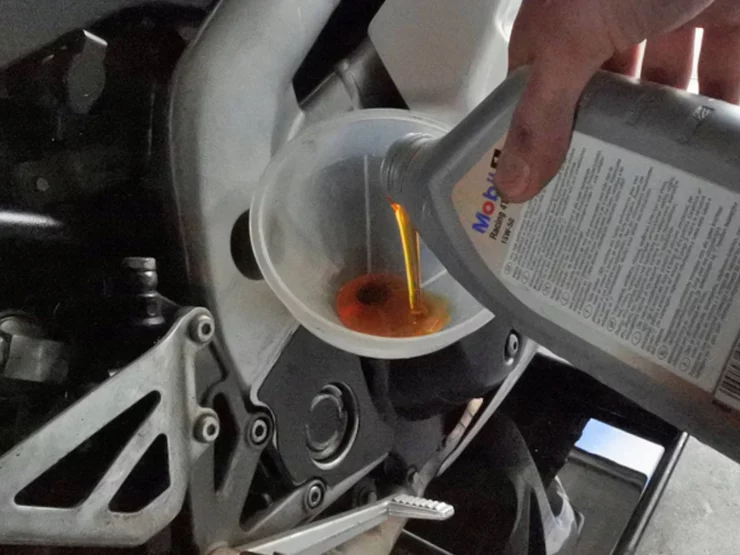
What is the capacity of oil for a Harley-Davidson?
To keep your Harley-Davidson motorcycle’s engine running smoothly and performing at its best, it’ll be important to understand the oil capacity of your bike. You need to make sure that you use the correct amount of oil during routine maintenance to keep your bike running smoothly. Typically, Harley-Davidson motorcycles require a little over three quarts of 20W-50 oil.
If you’re wondering what is the capacity of oil for a Harley-Davidson bike, then the answer will be approximately 3-4 quarts. However, the exact oil capacity differs from model to model. The first thing for determining the oil capacity for your bike would be to consult the motorcycle’s owner’s manual. Harley-Davidson offers specific details regarding the engine’s oil capacity, including the exact amount of oil required for your Harley-Davidson model and year.
The oil capacity will vary depending on the specific engine type and model, so it is important to refer to the manufacturer’s guidelines for accurate information. Following the recommended oil capacity will ensure that the engine receives the proper lubrication and protection it needs for optimal performance.
The oil capacity for your bike is influenced by numerous factors, including the engine’s design, size, and configuration. For instance, newer Harley-Davidson models with larger engines might require more oil than older models with smaller engines. Moreover, certain modifications to your motorcycle, such as adding an aftermarket oil cooler or changing the oil pan size, will also impact the oil capacity. If you have made any modifications to your bike, it is important to account for these changes when determining the ideal oil capacity.
It is important to not get confused between the recommended oil level and the total oil capacity of your motorcycle. The recommended oil level is the amount of oil that must be in the engine when it is at its optimal operating condition. It typically falls within a specific range indicated on the oil dipstick. Meanwhile, the total oil capacity will be the maximum amount of oil that the engine can hold. It includes the oil in the engine’s crankcase, oil filter, and other internal components. It is important to not overfill the engine with oil beyond its total capacity, as it can result in excessive pressure, leaks, and other potential issues.
During routine oil changes, it’ll be important to add the correct amount of oil based on the manufacturer’s recommended capacity. Overfilling or underfilling the engine can negatively impact performance and might even void your motorcycle’s warranty.
>>> READ MORE – What is the capacity of oil for a Harley-Davidson?
You should regularly check the oil level using the oil dipstick before and after each ride to ensure it falls within the recommended range. If you’re noticing any significant changes in the oil level or experience oil leaks, promptly address the issues to prevent potential damage to your engine.
>>> Read more about Harley-Davidson Parts & Maintenance <<<

